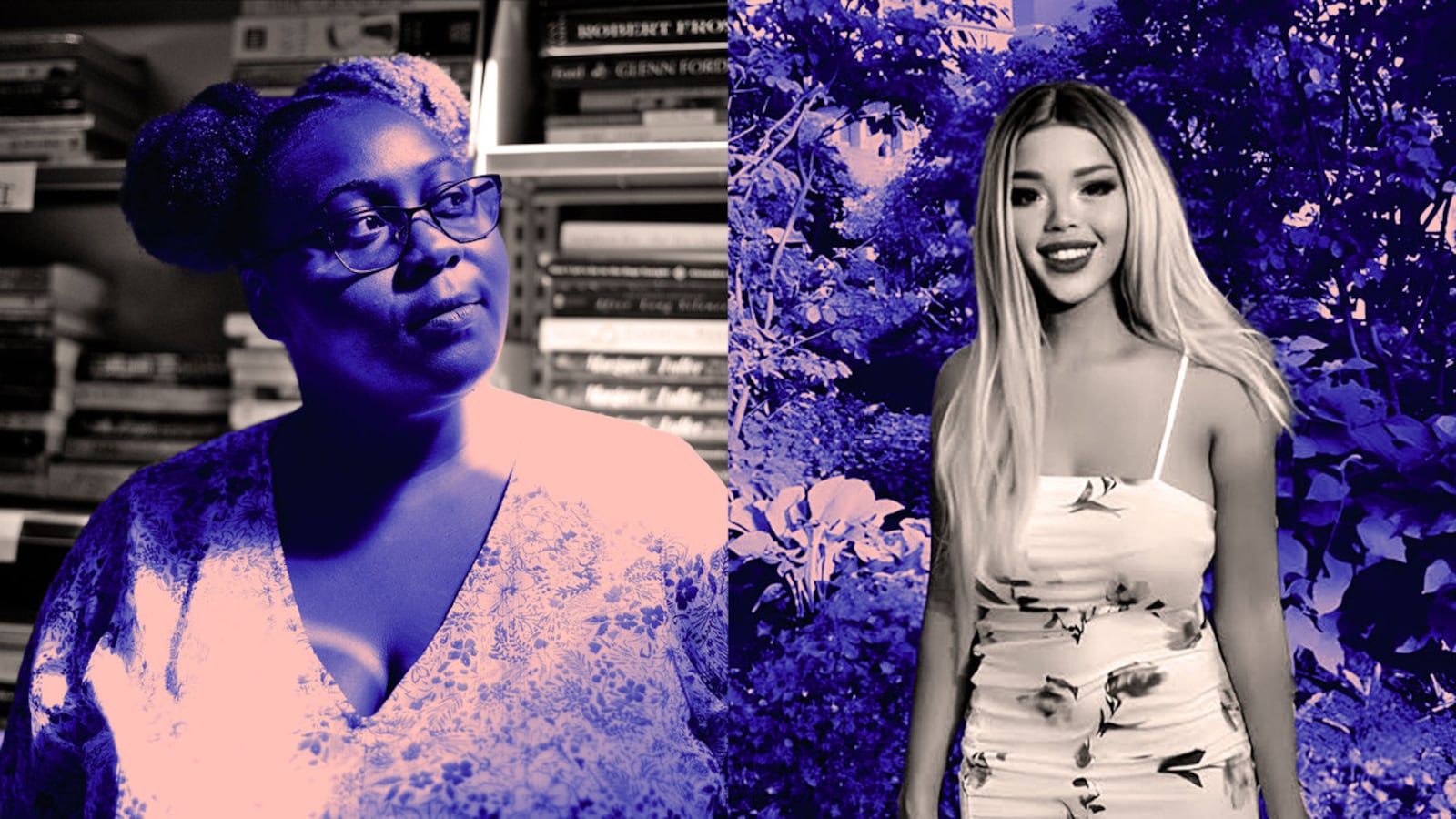Black authors who were targeted by Cait Corrain have banded together as they continue to suffer in the aftermath of having their books review-bombed.
Earlier this week, Corrain, a white author whose first novel, Crown of Starlight, was due for publication in 2024, was cut loose from her literary agent, publisher, and book distributor after she admitted to torching books—mainly by authors of color—with damaging reviews on the popular book-review platform, Goodreads.
Xiran Jay Zhao, one of the writers who suffered from Corrain’s negativity, and a whistleblower who spilled all the literary tea on social media in a 31-page document, said Corrain operated under multiple profiles for months and wrote negative reviews for many 2024 sci-fi and fantasy releases—the same genre as her novel.
Black author Bethany Baptiste, who was targeted by the negative review-bombing campaign, said prior to the scandal coming to light a group of authors who were supposed to launch their debut novels in 2024 joined together in a Slack group where they could share their experiences and support each other—one of those authors was none other than Corrain herself.
“That’s how we mostly knew each other, is from the debut Slack,” Baptiste continued. “Cait never really interacted in the Slack. When we found out that it was her, we were shocked because some of us had never once interacted with her.”
Baptiste, writer of The Poisons We Drink, said it wasn’t even the review-bombing of their books itself that upset the group of authors the most but that they had been open and vulnerable in what was supposed to be a safe space that Corrain had violated.
“What was upsetting was that she was review-bombing people she had private access to,” she said. “So, if you’re a lurker in Slack where we’re sharing personal experience, personal information, personal everything, because it’s supposed to be a safe place for us to support each other and you’re lurking, you have access to us, whether we know it or not. We’re talking about our experiences, and you’re getting jealous in the dark.”
Baptiste shared her feelings about the situation in lengthy threads on X, where Corrain’s fans and followers jumped on the defensive and launched a counter-attack. They accused her of being a liar and unfairly targeting Corrain. Baptiste said it added insult to injury that Corrain’s literary team didn’t contact and personally apologize to the authors affected before they fired their client.

Akure Phénix
Akure PhénixFellow first-time author Akure Phénix told The Daily Beast she was “floored” when she discovered Corrain was behind the review-bombing campaign.
Phénix said she borrowed personal elements from her grandmother’s experience surviving a genocide in the Congo to tell a reimagined story about the Greek goddess Persephone in her debut novel, Empire Wars. Phénix said she was crushed when her novel was hit with one-star reviews.
“On Goodreads… someone wrote, ‘People should avoid the book because it’s a weak book.’ I was so taken aback because my book wasn’t even out yet. I thought it was one troll, and more [reviews] started popping up,” Phénix told The Daily Beast.
Phénix said that she was bombarded with so many wildly negative reviews that she contacted Goodreads about possible spamming and ended up deleting her account to create a new one.
“I could’ve had so much more promotion, and all that’s gone,” she said. “I’ve had to start over from scratch… It ruined the excitement I had and the work I had that I wanted to dedicate to my grandmother who is now deceased.
“So it’s just like, starting over and just trying to be resilient,” Phénix said. “That’s basically all I can do. Like, all the hype for my book right now is kind of stalled. So, I’m just making the best of it right now.”

R. M. Virtues
R M VirtuesR.M. Virtues, a Black transgender author, was also part of Corrain’s Goodreads attack. However, unlike Baptiste and Phénix, he is an established indie author and was not part of the Slack group of debut writers. In fact, he didn’t realize he was one of the authors targeted until he saw three of his older books—Drag Me Up, Keep Me Close, and Let Me In—listed on social media as books that had been review-bombed.
“I’m not a debut author; you have no competition with me,” Virtues said regarding his relationship with Corrain. He added that he had been following the would-be published author for months, even promoting her material on his own accounts. But Corrain never followed him back.
“It was just shocking to me,” he said. “Then, because my books are Greek mythology; queer, Greek mythology; retellings; and most of the main characters are Black. So, I assume that’s why I was targeted.”
In Corrain’s “sincere apology” that she issued on social media Tuesday, she claimed she was “fighting a losing battle against depression, alcoholism and substance abuse.” She added that a change in medication for mental stability caused her to suffer a “complete psychological breakdown” and create multiple burner accounts on Goodreads, which led to her leaving “reviews that ranged from kind of mean to downright abusive.”
Baptiste, Phénix, and Virtues say they don’t accept Corrain’s “deflection-to-medication” apology, and that the situation isn’t just about “one bad apple.” Instead, they say it is illustrative of racism deeply rooted within the literary industry.
“I don’t want anything bad with Cait, but I want her to be brought to justice, and we were all going to handle it privately between ourselves,” Phénix said.

Bethany Baptiste
Bethany BaptisteBaptiste said Corrain’s agents and publishers didn’t give writers of color the respect of private apologies before the news went public. She says they missed an opportunity to address the racial disparities within the industry.
“This should have been told to us privately,” she said. “I was happy to see the consequences, but I was just not pleased they had that privilege of doing that while a Black woman is defending herself on the internet as a deflection of all the stuff that was going on.”
Meanwhile, Virtues said since the scandal came to light people seemed more concerned for Corrain’s well-being and mental health and not the effect on those people of color she hurt along the way.
“Black people, we got to work twice as hard to get half as far. In the publishing industry: twice as hard to get a quarter as far. And she had time to do all of this? To us?” he said.
“Y’all made it O.K. to just throw Black people under the bus. And then, do all that and get to have the path of blaming it on mental illness and substance abuse,” he added. “I still have not gone on a racist sabotage campaign of my fellow authors. So, I don’t know how we can keep making excuses for this.”






